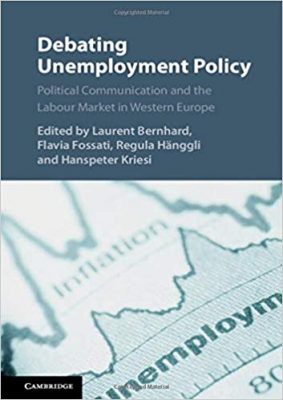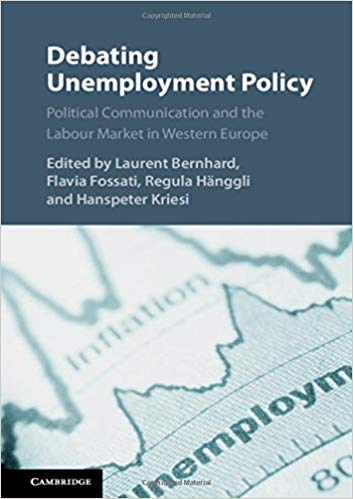 Editors: Laurent Bernhard, Flavia Fossati, Regula Hanggli, and Hanspeter Kriesi
Editors: Laurent Bernhard, Flavia Fossati, Regula Hanggli, and Hanspeter Kriesi
Publisher: Cambridge University Press – 340 pages
Book Review by: Sonu Chandiram
The Great Recession of 2007-2009 that began in the United States eventually spread to many countries of the world, although not all. It first spread to the Eurozone, and affected the countries on that region in varying lengths of time and degrees of severity.
A recession has been defined in many ways, but it has generally become accepted that a recession is two consecutive quarters of negative growth of the gross domestic product, or GDP. So we will accept this definition for the purpose of this book review.
Among the first countries to fall into a recession was Ireland, where it began in the second quarter of 2007. Ireland not only rapidly recovered from this recession, but over the recent years since then, its leaders have spurred tremendous economic growth in that country.
In 2018, Ireland’s gross domestic product was $386 billion, ranking No.31 in size among 186 countries of the world, based on data from the International Monetary Fund. Its GDP has grown at impressive rates: 4.9 percent in 2016, 7.2 percent in 2017, 6.8 percent in 2018, and an estimated 4.1 percent in 2019.
Ireland’s nominal GDP per capita was $76,099 in 2018, ranking fourth highest worldwide after Luxembourg, Switzerland, Macau, and Norway; its 2019 unemployment rate is just 4.4 percent.
On the other end of the scale among European countries affected, Greece was the hardest hit and for the longest time. Its economy began to slow down in the third quarter of 2008 and continued its contraction for six years until the second quarter of 2014, lasting 63 months.
For all of 2008, the GDP of Greece (No. 50 in size in the world) contracted to $249.9 billion from $251 billion in 2007, a small 0.3 percent reduction, but from 2009 to 2013, the declines were much larger: -4.3 percent, -5.5 percent, -9.1 percent, -7.3 percent and -3.2 respectively. The total contraction of the economy was a large $67 billion or nearly 27 percent, from $251 billion in 2007 to $184 billion in 2013.
The people also suffered from large income losses and declines in the standard of living as reflected in the severe (26 percent) decline of Greece’s GDP per capita from $22,718 in 2007 to $16,742 in 2013. It has since increased to $20,408, ranking No.39 among 186 countries, but has not yet caught up to its 2007 level. The unemployment rate in Greece as of May 2019 – at 18.1 percent – is the highest in Europe.
This foregoing discussion of the effects of the Great Recession on the economies of countries, particularly in Europe, serves to make the important point that it is not an academic discussion we are engaged in, but in severe, adverse changes in the lives of people who lost their jobs and perhaps were traumatized by not being able to buy essential needs like food and medicines.
What can be done by governments (and corporations, and social organizations, and other entities) to minimize the impacts of recessions, particularly unemployment? This book provides you the topics of discussion and debate relating to such topics, particularly as they relate to political communication. Below are the titles of the chapters of this book organized around its four Parts:
- Part I – The Context Structures and the Policy-specific Debates
- Introduction: Shaping the Debate on Unemployment and the Labor Market
- Theoretical Framework: Production of Policy-specific Communication
- The Political Contexts of National Policy Debates
- The Variety of National Debates
- Part II – Political Actors and their Assets
- What Affects Power in the Labor Market Domain?
- The Labor-Market Policy Space
- Beliefs or Interests: What is the Driving Force Behind Coalition Formation?
- Action Repertoires for Shaping the debates
- Part III – Communicating in Public
- Framing Strategies
- The Positioning of Actors in Public Debates
- Inside the Interaction Context
- Quality of Public Debates
- Part IV – Conclusion
- Conclusion
This book is very useful for people dealing in issues relating to unemployment in academia, corporations, government, labor, research, and other sectors of society. Its content includes interviews with labor market policy formulators.
This is an insightful book to read and keep for frequent reference now and in the future, such as for example, when trying to figure out solutions: what is the best approach to dealing with a particular labor or employment issue, and how to figure out what is in the best interest of all parties involved. It is a keepsake, for sure.
Editors and Authors:
Laurent Bernhard is a senior researcher at the Swiss Center foe Expertise in the Social Sciences at the University of Lausanne in Lausanne, France.
Flavia Fossati is Assistant Professor in Social Policy in the Political Science Department at the University of Vienna in Vienna, Austria.
Regula Hanggli is a specialist in Political Communication and full professor at the University of Fribourg in Fribourg, Switzerland. She is also a member of the Center for Center for Politics and Communication in Amsterdam, Holland
Hanspeter Kriesi holds the Stein Rokhan Chair in Comparative Politics at the European University in Florence, Italy.
Contributing Authors:
Christian Elmelund Presteker, PhD is Head of the Department of Political Science and Public Management at the University of Southern Denmark that has six campuses in Denmark.
Van Der Wurff is Director of the College of Social Sciences (CSS) at the University of Amsterdam in Holland.







